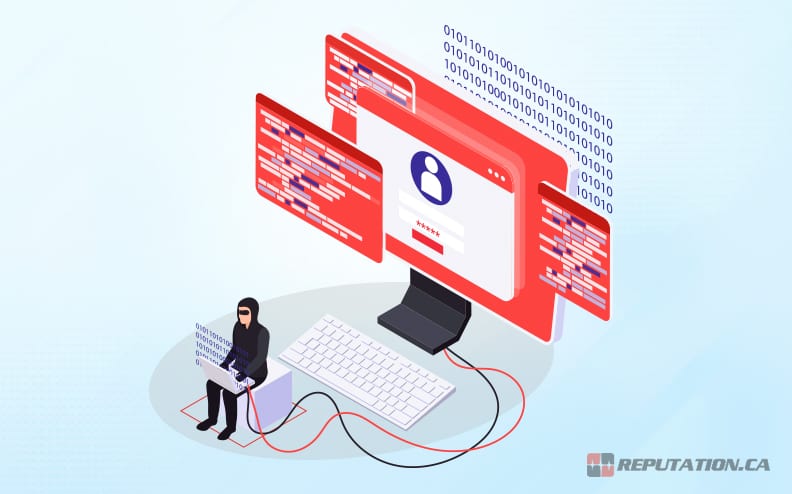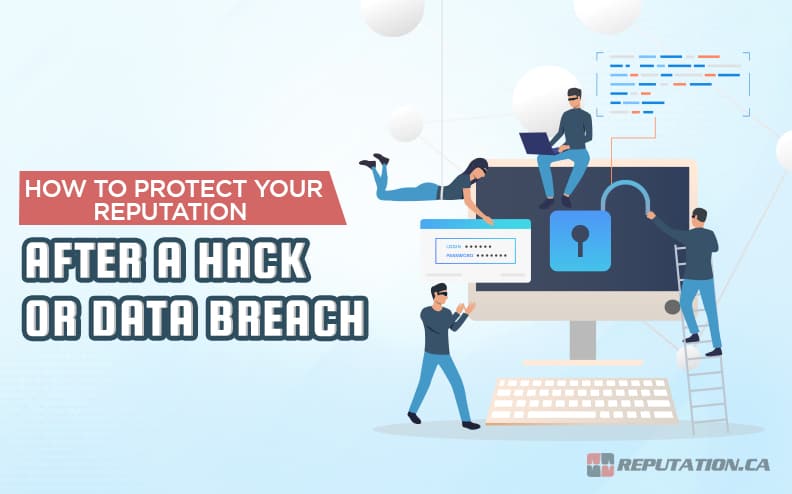It is no easy feat to create and preserve a positive reputation as a corporate entity or a private citizen. Doing so requires you to work carefully to cultivate an image of reliability, reason, and morality. Unfortunately, for something so difficult to build up, it is remarkably easy to destroy.
We live in a society where the slightest misstep can cause your reputation to plummet as those who followed you begin to disavow you in response. This can be devastating to a business or individual since the loss of reputation can annihilate your livelihood. This has been exacerbated by the advent of social technology, allowing the rapid transmission and dissemination of information regarding your public image. However, this technology has created another problem that can severely impact your reputation.
Another aspect of technological advancement is information technology used to preserve the integrity of private information. Unfortunately, information technology is not infallible, and cybercriminals can bypass security measures and access private data. The main concern lies with potential financial consequences since private information usually relates to banking information.
What many fail to realize is that these data breaches can adversely affect your public image by exposing information best left in obscurity. Recovering from such a breach can be difficult, but it is possible if you know the right steps.
Step #1: Determine What Was Breached
A company database stores a wide variety of data, most of which is related to the company’s projects and resources. However, depending on the company you are running, you might have information stored that affects more than just you. For example, if you are a company selling a product or service to the average citizen, you almost certainly have sensitive information about your customers on file. However, the hack attempt might not have reached that information and instead focused on your developing products. Ultimately, it is a matter of figuring out what information was accessed and how it could be used against you.

Virtually every successful company has a staff of information technology and cybersecurity professionals. Some outsource these services to 3rd party firms, but they remain protected. While these services normally protect the company from data breaches, cybercriminals improve with every passing year and can slowly overcome cybersecurity. When they breach a system, they usually pursue specific information, which falls to the company’s information technology staff to determine where the breach occurred.
Once you have identified what information was compromised in the breach, you can begin formulating a response. If you do not know what information was accessed by the hackers, you will find it difficult to keep your customers safe. If the hackers have the credit card information for your entire customer list, it could devastate them financially and destroy their faith in you. Knowledge is power, and the knowledge of what information was compromised is one of the most powerful tools you have when it comes to protecting your company’s reputation. The question then becomes what you can do about the situation.
Step #2: Inform Your Customers
There is a belief that when an unfortunate situation like a data breach arises, keeping quiet is the smartest move. However, this decision has the greatest chance of backfiring and destroying your reputation. While no company likes admitting they were the victim of a data breach, keeping it quiet only hurts your customer and, eventually, you. If your customers learn secondhand that a data breach allowed their private information to fall into the wrong hands, they will lose all faith in you. Additionally, intentionally deceiving your customers will replace a previously positive reputation with something negative.
No one likes to be lied to, and a customer who has been deceived by a company they have provided business to will adversely affect your image. In addition to shattering the faith your customers had in you, you endanger their livelihoods since their personal and financial information was likely the target of the hack attempt. If the hackers obtained even a single customer’s information, you must inform that customer as soon as possible so they can take measures to protect themselves.
Expedience and transparency are paramount to protecting your reputation following a data breach. Being upfront with your customers shows them you are honest and take the safety of their private information seriously. Transparency shows them you have no desire to risk their safety to protect your image and will make you more reliable in their eyes.

A major situation in 2016 involved the rideshare company Uber, where hackers managed to breach the company’s firewalls. The personal information of 57,000,000 Uber customers was compromised, but Uber’s representatives decided to handle the situation incorrectly. Rather than inform their customers of the breach and compromised data, Uber hired another group of hackers to try and cover it up. When the truth came out, Uber’s reputation took a large hit and displaced it as the leader of the rideshare industry.
Conversely, in 2019 the graphic design company Canva suffered a data breach that compromised 139,000,000 user accounts. Rather than cover the breach up, Canva locked down the website and neutralized the attack as it was in progress. They also kept their users apprised of the situation and told them what data was affected by the breach.
Keeping your customers informed of the good and the bad is a surefire way to secure their continued loyalty and preserve your image. It shows that you are unwilling to lie to your customers and take their privacy seriously. However, keeping your customers in the loop is not enough to preserve your reputation. Admitting to the issue is only one of the steps necessary to ensure your public image remains intact.
It’s also worth mentioning that most regions have laws requiring the disclosure of any data breach within a certain timeframe. The location in which your business is registered applies to your company, so it’s a good idea to look up the relevant laws that apply to you.
Step #3: Improve Your System
While transparency during an attack is important, it will ultimately mean little if your website remains vulnerable to further attacks. Some people expect company servers to be completely hackproof, even though that will never be possible. So long as cybercriminals exist, they will be honing their skills and attempting to overcome the security measures offered by modern security programs. Fortunately, most programs are constantly being updated to avoid becoming obsolete, and cybersecurity staff can help to enhance your protection. However, you will almost certainly have to update your security measures after suffering a breach of this nature.
After the breach, you will likely have customers calling for information on how you plan to prevent a repeat of the incident. Your customers are liable to be upset over their information being compromised regardless of how rare such breaches are. When such a breach occurs, and information is stolen, they want to know that their data will be safe. If you cannot provide a satisfactory answer as to what you will do to resecure your network, your reputation will suffer.
You will likely need to update your system’s security software, such as anti-virus programs and network firewalls. This task is typically delegated to your information technology department as they will have the training to perform the updates and patch the compromised firewall sections. However, this is an internal task that your customers will not be aware is happening unless you come out and tell them. Therefore, your best bet is to confer with your IT department and get a general idea of what needs to be fixed to resecure your network.

Once you have a general idea of what needs to be updated to make your network secure, you will need to inform your customers of the planned changes. You will not have to release the technical details but rather the end goal of those changes. For example, inform your customers that you are reinforcing your firewalls and encrypting data to ensure unauthorized users cannot access their information the same way as before. Letting them know that you are taking the breach seriously and enacting measures to shore up the safety of their data will drastically improve your public image.
With your system up to snuff and an official statement, you should find the hit to your reputation minimal. Customers are more willing to forgive companies when they own up to their mistakes and take measures to prevent an encore of the issue. Once that is dealt with, the next step is helping your customers feel more secure about what kind of information is stored in your network.
Step #4: Listen to Your Customers
The average customer is reasonably nervous about providing personal or financial information to a corporate entity, especially since most companies keep that information on file to simplify future transactions. While this stored information is meant to offer convenience, it sometimes enables hackers to access more information than they would otherwise. This is why many customers want to have a little more insight into what kind of information you are storing and retain some agency over what you can store. This concern led to a survey to help identify what companies could do to make customers feel safer.
A website known as State of Connected Customer assessed the preferences of customers across the country to determine what practices would make the customer feel safer and trust the company.

The main results were as follows:
- 92% of customers are more likely to trust a company that allows the customer to control what information you collect on them.
- 91% of customers are more likely to put their trust in a company that is transparent about what that collected information is used to accomplish.
- 91% of customers are more likely to trust a company that takes a firm stance on protecting their information.
- 88% of customers are more likely to trust a company that asks for their consent before using their information.
- 88% of customers are more likely to trust a company that does not share their information with 3rd parties without their consent.
- 86% of customers are more likely to trust a company that explains how the stored information will improve their customer experience.
The survey collected a few other results, but these are the ones that have a more direct impact on your company’s reputation. Customers know what they want and are receptive to companies that take those desires seriously. While you are not expected to completely change the course of your company, listening to the requests surrounding the personal information of your customers can work wonders for your company’s image.
Following these steps can help prevent a data breach from adversely affecting your reputation. However, reputation management goes beyond protecting your image from repercussions resulting from a data breach. The effort that must go into reputation management can be more than a company can handle alone. Fortunately, there are alternatives.
Take Your Reputation Back!
Data breaches are one of the biggest concerns of the modern era. Not only is your information at risk if you are not careful, one breach of your server can devastate how the public perceives you. However, a data breach does not have to end your company’s reputation. You can take measures to protect your reputation and company that will help reaffirm the confidence your customers have in you.
While information technology professionals can help with the technical side of shoring up your cybersecurity protocols, the task of managing the public relations side of things lies with you. The effort that goes into reputation management is extensive, and some companies can be overwhelmed if they lack a dedicated public relations department. Fortunately, there is a solution.

We at Reputation specialize in reputation marketing and management. While we are not experts in patching a firewall, we can help address your customers and ease their concerns about the safety of their data. We offer public relations services and can regulate your company’s social media profile to help connect with your customers after a data breach occurs. Keeping your public image intact after experiencing a major security breach can be difficult but not impossible. If you need assistance managing your reputation, we encourage you to visit our website and peruse our available services. It is time to take your reputation back!











